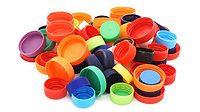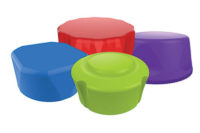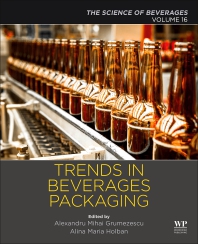Beverage caps and closures global sales to increase through 2021
Demographic trends and security requirements fueling innovation

As the U.S. beverage market experiences shifts among leading category performers as well as growth from alternative and emerging segments, packaging components and materials also are seeing shifts among top-performing segments as well as evolving demands.
Cleveland-based The Freedonia Group predicts in its “Global Caps & Closures Market, 9th Edition” report that caps and closures used for beverages will reach 1.5 trillion units in 2021. This projection is based on 3.5 percent annual growth.
The market research firm notes that among the factors contributing to this growth is consumers’ gravitation toward healthy, convenient beverages, including bottled water.
“Premium beverages also are seeing outsized gains in developed markets,” Analyst Mike Richardson said in a statement.
It also noted in the report that closures for bottled water will post the largest gains among established beverage categories. Additionally, developing areas such as India and Indonesia will contribute to the global growth of these closures, it reports. In terms of unit market share, The Freedonia Group forecasts that bottled water’s closure usage will account for 35 percent, with “other beverages” being the next largest with 29 percent of market share. Beer and carbonated soft drinks are expected to decline their closure market share through 2021, accounting for 18 percent and 17 percent, respectively.
Additional beverage categories that will contribute to global growth for caps and closures are sports and energy drinks, ready-to-drink tea and coffee, as well as other niche categories that utilize premium or unique packaging, the report states.
Cap and closure manufacturers also have noticed the impact that consumer beverage trends are having on the market.
Jean-Marc Philbois, beverage global market development president for Crystal Lake, Ill.-based Aptar Food + Beverage, notes that health and wellness, going green, and on-the-go trends have had the greatest impact on beverage caps and closures.
“We have seen a growth in bottled water and functional drinks and a slowdown in concentrates and juices,” he says. “This is in part due to consumers looking for healthier drinks with less sugar. This has impacted the way brands are positioning themselves. Many are pushing new healthier products and this has created a more varied product offering. This, in turn, requires new SKUs with more diversified bottle sizes and also more differentiated closures. Flip-top closures have been able to provide this added value differentiation and demand for them has grown substantially.”
Philbois explains that Aptar Food + Beverage has diversified its portfolio in order to support these trends and need states.
“Some examples are our Light Weighed Original closure, our non-detachable tamper-evidence systems like in our upcoming Guardian closure, or our new neck sizes with our Uno one piece Flip-top Closure,” he says.
For Pittsford, N.Y.-based Karma Culture LLC, health-and-wellness trends were a driving force in the creation of its Karma Wellness brand as well as its patented Karma Push Cap.
“Driving Karma’s growth is exploding demand for health-and-wellness products and, in particular, the need for a product to deliver on its promise,” says C.J. Rapp, chief executive officer for Karma Culture. “No longer can a beverage just look healthy. Instead, the ingredients must meet or exceed the brand’s promise. Additionally, use of the Karma Push Cap helps to deliver a ‘clean label’ for a cold-filled beverage. Prior to separating the active ingredients in the cap, use of preservatives was required for a cold-filled beverage. So, by placing the active ingredients in the cap, which are then infused into the water only seconds before consumption, [it] eliminates the need for preservatives.”
Sheila Heath, director of sales for Crown Closures North America, a division of Philadelphia-based Crown Holdings Inc., explains that consumers’ desires for health-and-wellness products dovetails into sustainability measures, including the usage of packaging materials.
“Many of the consumers that seek out health-and-wellness products also have a vested interest in being environmentally responsible,” she says. “At the same time, brands are looking to package their products in sustainable formats to align with their healthful nature and to engage consumers who have said interests. Metal closures are not only easy to open and eye-catching, but they are recyclable. Metal packaging in general is 100 percent and infinitely recyclable with no loss of quality after recycling.”
Aptar Food + Beverage’s Philbois also recognizes the benefits realized by sustainable practices such as lightweighting and recycling support measures.
“Right-weighting has been crucial. We have made sure our caps keep optimal performance all whilst being as light as possible,” he says. “Our newer closures can now accommodate cold-, hot- or aseptically filled products, reducing or eliminating foils and improving recyclability. Other developments like our non-detachable tamper-evidence systems, our SimpliSqueeze swimming silicone valves and our Stay-With band, which helps keep the closure attached to the bottle even if unscrewed, can all help improve recycling rates. We are also looking into developing closures with recycled materials but the actual customer demand is not there yet.”
For Karma Culture, sustainability was a crucial factor for deciding what type of material to use when designing its Karma Push Cap. “The Karma Push Cap is made of low-density polyethylene (LDPE), which is highly recyclable,” Rapp says. “Sustainability is a big part of Karma’s long-term strategy. How could it not, the very definition of ‘karma’ is what goes around comes around.”
Cap and closure manufacturers also recognize the impact that shifting consumer demographics are having on the market.
“Closure Systems International (CSI) believes that there are a handful of macro trends that currently influence consumer purchasing decisions, and we believe it is largely contingent on diverse demographics and changing lifestyles,” says Clint Rush, director of marketing and business development for Indianapolis-based CSI. “The world’s population of people 60 years of age and older is growing. While this is reason to celebrate, because it is an indication of improving global health and lifespan, this demographic group is often faced with economic and health-related challenges that packaging and beverage companies should address.”
The millennial generation and its value set also are having an impact and should be considered by beverage-makers, he adds. “This generation is globally oriented, extremely diverse, technologically brilliant, open to change and self-expressive,” he says. “They value authenticity; they are loyal if engaged on their own terms; they are environmentally aware; they are digitally connected; and they have a need for instant information, gratification and sharing. Children also have their own set of needs when it comes to marketing and packaging development.”
Noting that caps and closures are just as cognizant to the needs of bottlers and brand owners as they are to consumer trends, CSI identified seven trend categories that influence innovation initiatives, Rush explains.
Those seven trends are wellness, consumer convenience and functionality, brand promotion and decoration, product integrity and preservation, cost reduction, environmental stewardship, and eCommerce.
Safe and secure
Because of the health-and-wellness movement, primary packaging and caps and closures manufacturers are recognizing the need to accommodate this evolving market to protect the products and brands they serve.
“It is believed that packages and closures will need to provide secure sealing on many pack types and sizes containing healthy beverages,” Rush explains. “This includes plastic bottles, glass bottles, aluminum bottles, pouches, cartons and more. Packaging and closure companies such as CSI will need to help brand owners protect the integrity of their natural products while also helping them effectively communicate their wellness benefits and differentiating their packaging from the sea of other competing products on the store shelves, in vending machines, at venues and in retail coolers around the world.”
Rush adds that this has encouraged companies like CSI to develop caps and closures that utilize the latest technology to further innovation.
“We are currently in the process of expanding our portfolio of products and services, employing cutting-edge technologies to help our customers enhance their brands, operating more efficiently, and adding value to consumers,” he says. “We’re also pursing growth opportunities to expand into new geographic areas and into new markets where we believe our expertise could be utilized to improve the consumer experience. Innovation is and will continue to be at the forefront of these ongoing development and expansion initiatives.”
For the beverage market, CSI released the new Sport Flip Top 38mm, which is based on ergonomic expectations and aesthetic appeal, Rush explains. “It’s a versatile, high-performance sports cap designed for one-hand opening for on-the-go convenience of hot-fill beverages (sport drinks, juices and functional waters),” he says. “[It is] ergonomically designed for optimized drinking comfort while safety precautions were taken by providing dual tamper evidence.”
The company also can develop custom solutions through its Studio C Creations and just released custom carafe closures. “CSI’s new custom carafe closures are ideal for differentiating dairy, juice and other non-carbonated beverage brands,” Rush says. “These double-wall caps offer unique aesthetics and delight consumers with their easy-to-grip shapes.”
Crown’s Heath adds that beverage-makers want to be assured that the caps and closures they employ on their products are reputable and turn to suppliers that can provide that.
“In general, beverage brands seek a closure that will protect the integrity of their product — and that is why they oftentimes choose metal closures,” Heath says. “Metal closures offer a reliable barrier to external elements, keeping drinks fresh and providing the convenience of an easily re-closeable package. Aside from this benefit, brand owners opt for metal closures because they offer the package a traditional look and feel that is known and trusted.”
To support this, Crown’s portfolio features a range of metal closures for the beverage manufacturing market. “For beverage manufacturers, Crown offers small-diameter metal twist closures, small-diameter continuous-thread closures and the 40-mm Ideal Closure,” Heath says. “The Ideal Closure is best suited for glass and plastic bottles used for retorted beverages that include dairy, such as coffee containing milk.”
Karma Culture’s Rapp highlights how the company’s patented cap has helped beverage-makers and pharmaceutical manufacturers preserve the efficacy of their products. “We provide the Karma Push Cap for use among multinational beverage makers and pharmaceutical companies,” he says. “Use of the cap becomes a solution to what are otherwise unstable ingredients, by shipping the active ingredients separately and simultaneously.” BI
Looking for a reprint of this article?
From high-res PDFs to custom plaques, order your copy today!







